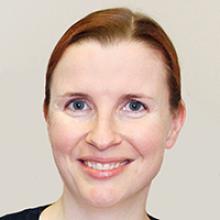Éducation :
- BA Anglais et Design (Brighham Young University, 2000)
- MA TESOL (Brighham Young University, 2002)
- Doctorat Linguistique appliquée/ESL et administration de l'enseignement supérieur (Purdue University, 2006)
Information :
Dr. Lucie Moussu est professeure en études de la rédaction, directrice du Centre de rédaction RMC, et présidente du comité sur l’IA Générative de l'université. De 2009 à 2021, elle était professeure associée en études de la rédaction et directrice du Centre for Writers de l'Université de l'Alberta. Avant cela, elle a travaillé à l'Université Métropolitaine de Toronto pendant trois ans en tant que professeure adjointe en linguistique appliquée, coordinatrice des cours de rédaction en anglais langue seconde, et directrice du Centre de rédaction. Dr. Moussu est membre du comité de rédaction du Journal of Response to Writing et de la task force sur le handicap de l'Association Internationale des Centres d'Écriture, et elle participe également régulièrement aux comités d'adjudication des subventions du CRSH. Ses intérêts de recherche incluent la rédaction en langue seconde, l'administration des centres de rédaction, et le rôle de l'intelligence artificielle générative dans a pédagogie et l'intégrité académique.
Publications:
- Herzl-Betz, R., Moussu, L., Yabe, M., Agnihotri, S., Perdue, S. W., Ryan, H. (2023, juin). Modeling Accessibility: Perspectives from the Accessibility Task Force. WLN: A Journal of Writing Center Scholarship 47(4), 3-14.
- Moussu, L. (2022). The ultimate guide to poorly designed research projects. WLN: A Journal of Writing Center Scholarship 47(1), 4-11.
- Moussu, L. et Sgaramella, S. (2022). Guided writing instruction group: Connecting L2 graduate writing proficiency to academic culture and language. Dans M. Allen, E. Ene, et K. McIntosh (Eds.), Building Internationalized Spaces: Second Language Perspectives on Developing Language and Cultural Exchange Programs in Higher Education (pp. 186-207). Michigan Press.
- Moussu, L. et Grant, C. (2020). A collaborative approach to supporting L2 students with multimodal work in the composition classroom and the writing center. Journal of Response to Writing, (6)2.
- Moussu, L. (2018). Strengths of NESTs and NNESTs. Dans J. I. Liontas (Ed.), The TESOL Encyclopedia of English Language Teaching (pp. 1217-1223). Hoboken. NJ: Wiley/Blackwell Publishers.
- Moussu, L. (2018). Shortcomings of NESTs and NNESTs. Dans J. I. Liontas (Ed.), The TESOL Encyclopedia of English Language Teaching (pp. 1211-1217). Hoboken. NJ: Wiley/Blackwell Publishers.
- Moussu, L. (2016). Student attitudes, teacher self-perceptions, and Intensive English Program administrator beliefs and practices towards native and nonnative ESL teachers: Implications for teacher education and professional development. Chapitre de livre pour Teacher Education and Professional Development in TESOL: Global Perspectives, édité par TIRF (TESOL’s International Research Foundation for English Language Education). Routledge, pp. 68-80.
- Moussu, L. et David, N. (2015). Writing centers: Finding a center for ESL writers. Chapitre de livre dans ESL Readers and Writers in Higher Education: Understanding Challenges, Providing Support, edited by Norman Evans and Neil Anderson. Routledge.
- Moussu, L. (2013, Printemps). Let’s Talk! ESL students’ needs and writing centre philosophy. The TESL Canada Journal (30)2, 55-68.
- Moussu, L. (2012). Writing center. Book chapter in R. Kubota & Y. Sun (Eds), Demystifying Career Paths after Graduate School: A Guide for Second Language Professionals in Higher Education. Information Age Publishing Press.
- Moussu, L. (2012, February). Bridging gaps--An unusual writing center bringing unusual high school students to university. WLN: A Journal of Writing Center Scholarship 36(5-6), 7-10.
- Moussu, L. (2010). Influence of teacher-contact time and other variables on ESL students attitudes towards native- and nonnative-English-speaking teachers. TESOL Quarterly, 44(4), 746-768.
- Moussu, L. (2010). Toward a conversation between ESL teachers and Intensive English Program administrators. TESOL Journal, 1(4), 400-426.
- Moussu, L. & Llurda, E. (2008). Non-native English-speaking ESL teachers: History and Research. Language Teaching, 41(3), 315-348.
- Moussu, L. & Braine, G. (2006). The attitudes of ESL students towards nonnative English language teachers. TESL Reporter, 39, 33-47
